Organisation Behaviour Report: Analysing 4COM Plc's Practices
VerifiedAdded on 2020/11/12
|15
|4586
|346
Report
AI Summary
This report provides an analysis of the organisation behaviour within 4COM Plc, a telecommunications company. It examines the influence of culture, politics, and power on individual and team performance, highlighting the importance of an appropriate work environment. The report delves into various motivation theories, including Maslow's hierarchy of needs and Herzberg's two-factor theory, and how they are applied to enhance employee morale and achieve company goals. Furthermore, it contrasts effective and ineffective teams, emphasizing the application of organisational behaviour concepts to improve employee performance and overall business outcomes. The report concludes by stressing the importance of leadership in creating a positive and productive work environment at 4COM Plc, leading to increased customer satisfaction and market position.
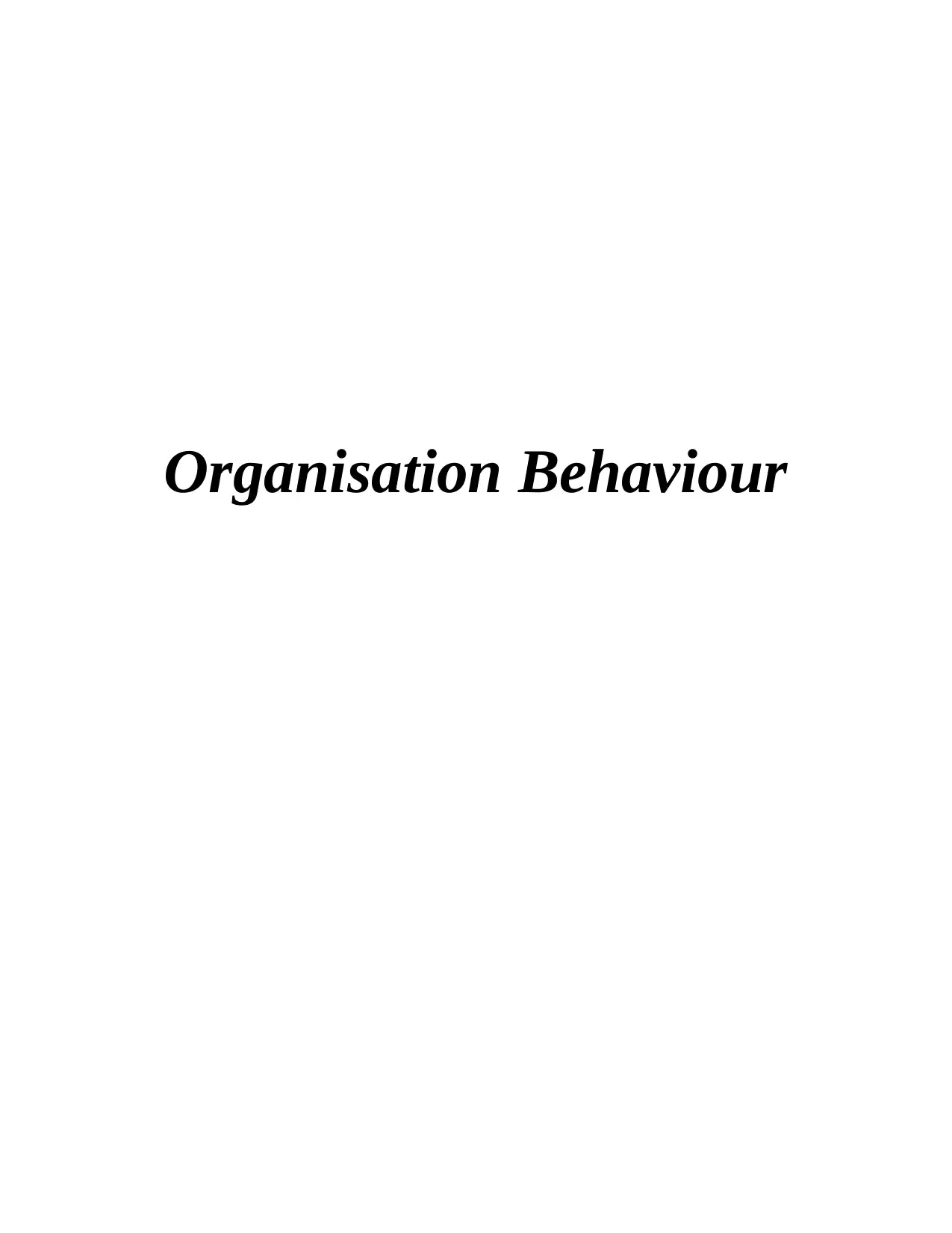
Organisation Behaviour
Paraphrase This Document
Need a fresh take? Get an instant paraphrase of this document with our AI Paraphraser
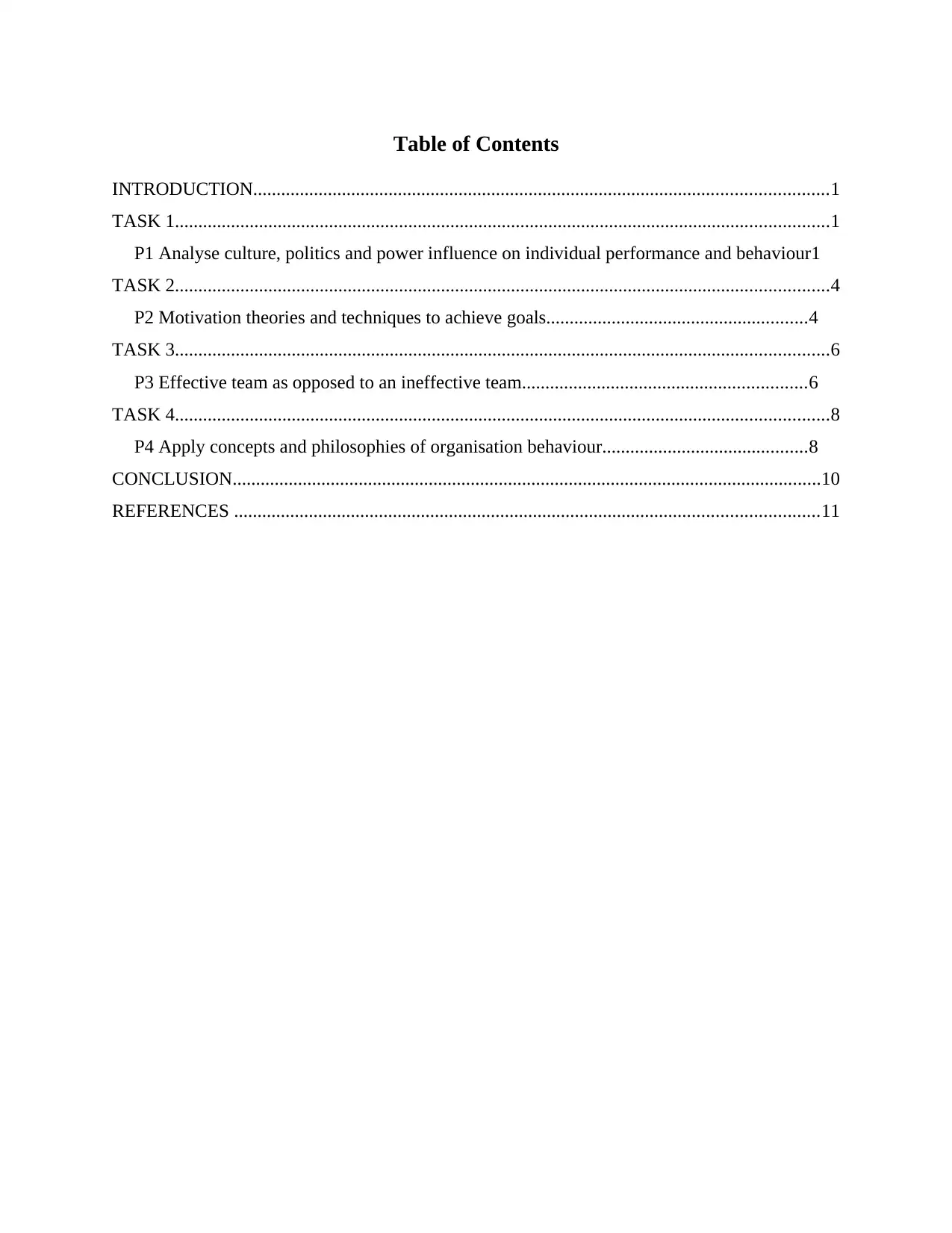
Table of Contents
INTRODUCTION...........................................................................................................................1
TASK 1............................................................................................................................................1
P1 Analyse culture, politics and power influence on individual performance and behaviour1
TASK 2............................................................................................................................................4
P2 Motivation theories and techniques to achieve goals........................................................4
TASK 3............................................................................................................................................6
P3 Effective team as opposed to an ineffective team.............................................................6
TASK 4............................................................................................................................................8
P4 Apply concepts and philosophies of organisation behaviour............................................8
CONCLUSION..............................................................................................................................10
REFERENCES .............................................................................................................................11
INTRODUCTION...........................................................................................................................1
TASK 1............................................................................................................................................1
P1 Analyse culture, politics and power influence on individual performance and behaviour1
TASK 2............................................................................................................................................4
P2 Motivation theories and techniques to achieve goals........................................................4
TASK 3............................................................................................................................................6
P3 Effective team as opposed to an ineffective team.............................................................6
TASK 4............................................................................................................................................8
P4 Apply concepts and philosophies of organisation behaviour............................................8
CONCLUSION..............................................................................................................................10
REFERENCES .............................................................................................................................11

⊘ This is a preview!⊘
Do you want full access?
Subscribe today to unlock all pages.

Trusted by 1+ million students worldwide
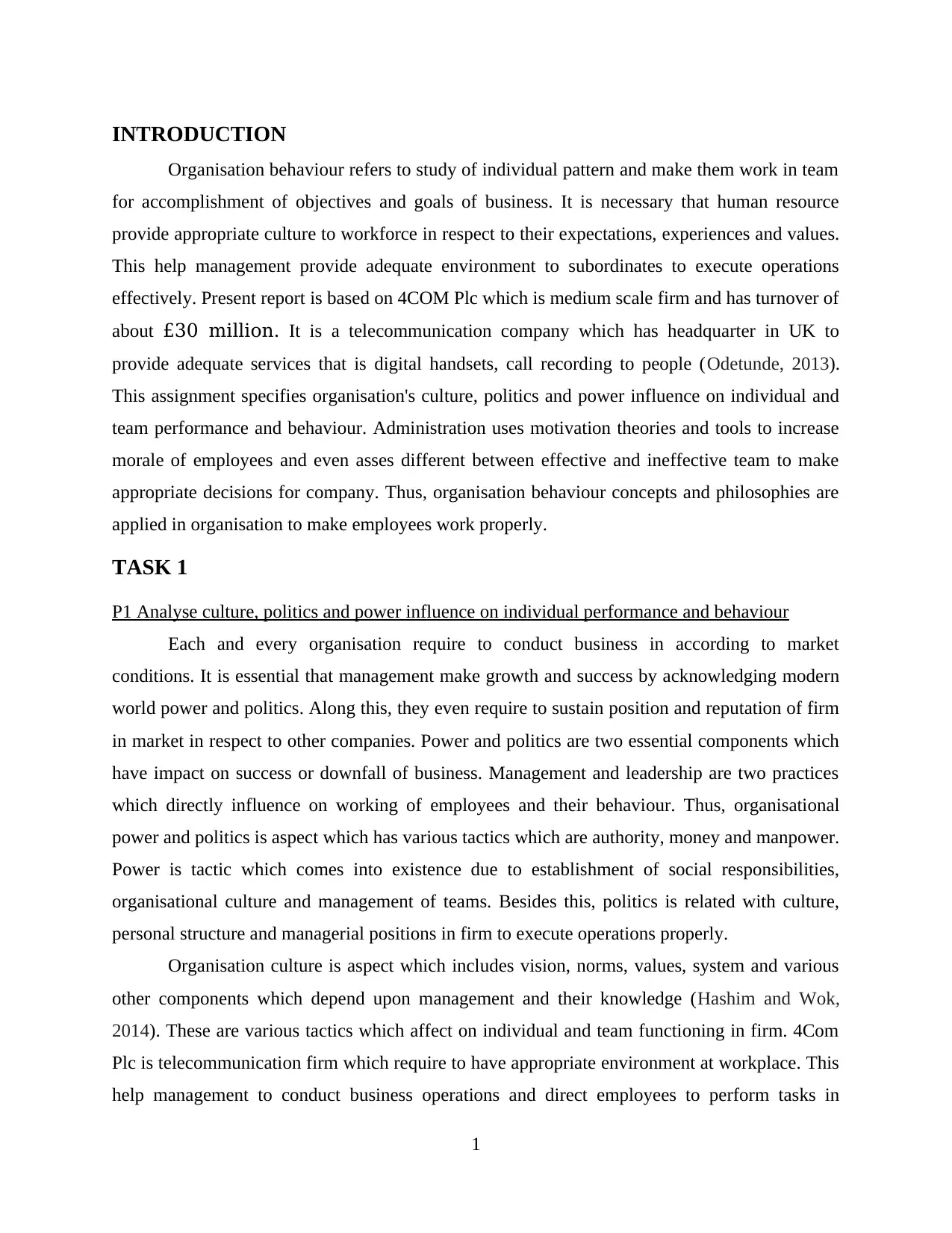
INTRODUCTION
Organisation behaviour refers to study of individual pattern and make them work in team
for accomplishment of objectives and goals of business. It is necessary that human resource
provide appropriate culture to workforce in respect to their expectations, experiences and values.
This help management provide adequate environment to subordinates to execute operations
effectively. Present report is based on 4COM Plc which is medium scale firm and has turnover of
about £30 million. It is a telecommunication company which has headquarter in UK to
provide adequate services that is digital handsets, call recording to people (Odetunde, 2013).
This assignment specifies organisation's culture, politics and power influence on individual and
team performance and behaviour. Administration uses motivation theories and tools to increase
morale of employees and even asses different between effective and ineffective team to make
appropriate decisions for company. Thus, organisation behaviour concepts and philosophies are
applied in organisation to make employees work properly.
TASK 1
P1 Analyse culture, politics and power influence on individual performance and behaviour
Each and every organisation require to conduct business in according to market
conditions. It is essential that management make growth and success by acknowledging modern
world power and politics. Along this, they even require to sustain position and reputation of firm
in market in respect to other companies. Power and politics are two essential components which
have impact on success or downfall of business. Management and leadership are two practices
which directly influence on working of employees and their behaviour. Thus, organisational
power and politics is aspect which has various tactics which are authority, money and manpower.
Power is tactic which comes into existence due to establishment of social responsibilities,
organisational culture and management of teams. Besides this, politics is related with culture,
personal structure and managerial positions in firm to execute operations properly.
Organisation culture is aspect which includes vision, norms, values, system and various
other components which depend upon management and their knowledge (Hashim and Wok,
2014). These are various tactics which affect on individual and team functioning in firm. 4Com
Plc is telecommunication firm which require to have appropriate environment at workplace. This
help management to conduct business operations and direct employees to perform tasks in
1
Organisation behaviour refers to study of individual pattern and make them work in team
for accomplishment of objectives and goals of business. It is necessary that human resource
provide appropriate culture to workforce in respect to their expectations, experiences and values.
This help management provide adequate environment to subordinates to execute operations
effectively. Present report is based on 4COM Plc which is medium scale firm and has turnover of
about £30 million. It is a telecommunication company which has headquarter in UK to
provide adequate services that is digital handsets, call recording to people (Odetunde, 2013).
This assignment specifies organisation's culture, politics and power influence on individual and
team performance and behaviour. Administration uses motivation theories and tools to increase
morale of employees and even asses different between effective and ineffective team to make
appropriate decisions for company. Thus, organisation behaviour concepts and philosophies are
applied in organisation to make employees work properly.
TASK 1
P1 Analyse culture, politics and power influence on individual performance and behaviour
Each and every organisation require to conduct business in according to market
conditions. It is essential that management make growth and success by acknowledging modern
world power and politics. Along this, they even require to sustain position and reputation of firm
in market in respect to other companies. Power and politics are two essential components which
have impact on success or downfall of business. Management and leadership are two practices
which directly influence on working of employees and their behaviour. Thus, organisational
power and politics is aspect which has various tactics which are authority, money and manpower.
Power is tactic which comes into existence due to establishment of social responsibilities,
organisational culture and management of teams. Besides this, politics is related with culture,
personal structure and managerial positions in firm to execute operations properly.
Organisation culture is aspect which includes vision, norms, values, system and various
other components which depend upon management and their knowledge (Hashim and Wok,
2014). These are various tactics which affect on individual and team functioning in firm. 4Com
Plc is telecommunication firm which require to have appropriate environment at workplace. This
help management to conduct business operations and direct employees to perform tasks in
1
Paraphrase This Document
Need a fresh take? Get an instant paraphrase of this document with our AI Paraphraser
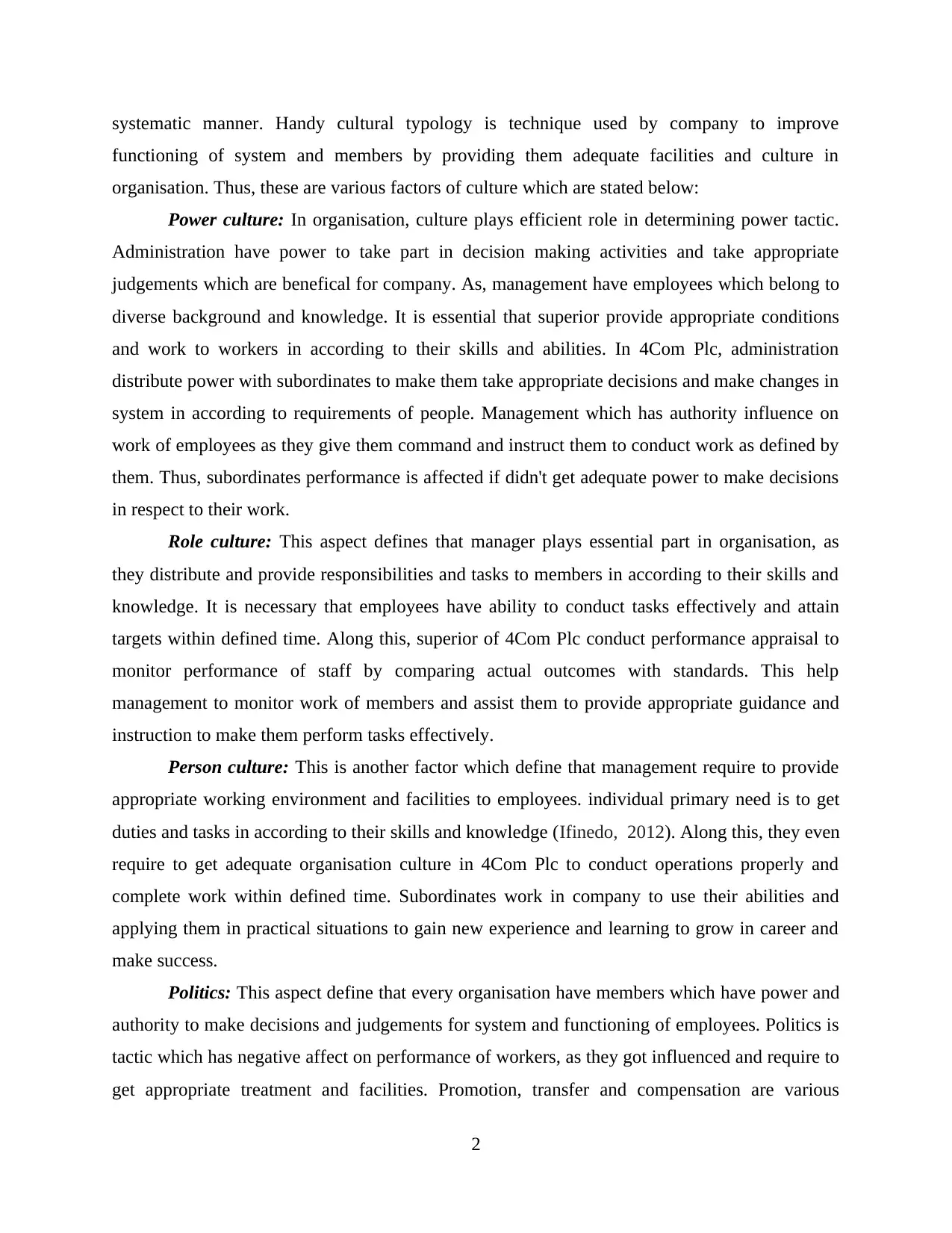
systematic manner. Handy cultural typology is technique used by company to improve
functioning of system and members by providing them adequate facilities and culture in
organisation. Thus, these are various factors of culture which are stated below:
Power culture: In organisation, culture plays efficient role in determining power tactic.
Administration have power to take part in decision making activities and take appropriate
judgements which are benefical for company. As, management have employees which belong to
diverse background and knowledge. It is essential that superior provide appropriate conditions
and work to workers in according to their skills and abilities. In 4Com Plc, administration
distribute power with subordinates to make them take appropriate decisions and make changes in
system in according to requirements of people. Management which has authority influence on
work of employees as they give them command and instruct them to conduct work as defined by
them. Thus, subordinates performance is affected if didn't get adequate power to make decisions
in respect to their work.
Role culture: This aspect defines that manager plays essential part in organisation, as
they distribute and provide responsibilities and tasks to members in according to their skills and
knowledge. It is necessary that employees have ability to conduct tasks effectively and attain
targets within defined time. Along this, superior of 4Com Plc conduct performance appraisal to
monitor performance of staff by comparing actual outcomes with standards. This help
management to monitor work of members and assist them to provide appropriate guidance and
instruction to make them perform tasks effectively.
Person culture: This is another factor which define that management require to provide
appropriate working environment and facilities to employees. individual primary need is to get
duties and tasks in according to their skills and knowledge (Ifinedo, 2012). Along this, they even
require to get adequate organisation culture in 4Com Plc to conduct operations properly and
complete work within defined time. Subordinates work in company to use their abilities and
applying them in practical situations to gain new experience and learning to grow in career and
make success.
Politics: This aspect define that every organisation have members which have power and
authority to make decisions and judgements for system and functioning of employees. Politics is
tactic which has negative affect on performance of workers, as they got influenced and require to
get appropriate treatment and facilities. Promotion, transfer and compensation are various
2
functioning of system and members by providing them adequate facilities and culture in
organisation. Thus, these are various factors of culture which are stated below:
Power culture: In organisation, culture plays efficient role in determining power tactic.
Administration have power to take part in decision making activities and take appropriate
judgements which are benefical for company. As, management have employees which belong to
diverse background and knowledge. It is essential that superior provide appropriate conditions
and work to workers in according to their skills and abilities. In 4Com Plc, administration
distribute power with subordinates to make them take appropriate decisions and make changes in
system in according to requirements of people. Management which has authority influence on
work of employees as they give them command and instruct them to conduct work as defined by
them. Thus, subordinates performance is affected if didn't get adequate power to make decisions
in respect to their work.
Role culture: This aspect defines that manager plays essential part in organisation, as
they distribute and provide responsibilities and tasks to members in according to their skills and
knowledge. It is necessary that employees have ability to conduct tasks effectively and attain
targets within defined time. Along this, superior of 4Com Plc conduct performance appraisal to
monitor performance of staff by comparing actual outcomes with standards. This help
management to monitor work of members and assist them to provide appropriate guidance and
instruction to make them perform tasks effectively.
Person culture: This is another factor which define that management require to provide
appropriate working environment and facilities to employees. individual primary need is to get
duties and tasks in according to their skills and knowledge (Ifinedo, 2012). Along this, they even
require to get adequate organisation culture in 4Com Plc to conduct operations properly and
complete work within defined time. Subordinates work in company to use their abilities and
applying them in practical situations to gain new experience and learning to grow in career and
make success.
Politics: This aspect define that every organisation have members which have power and
authority to make decisions and judgements for system and functioning of employees. Politics is
tactic which has negative affect on performance of workers, as they got influenced and require to
get appropriate treatment and facilities. Promotion, transfer and compensation are various
2
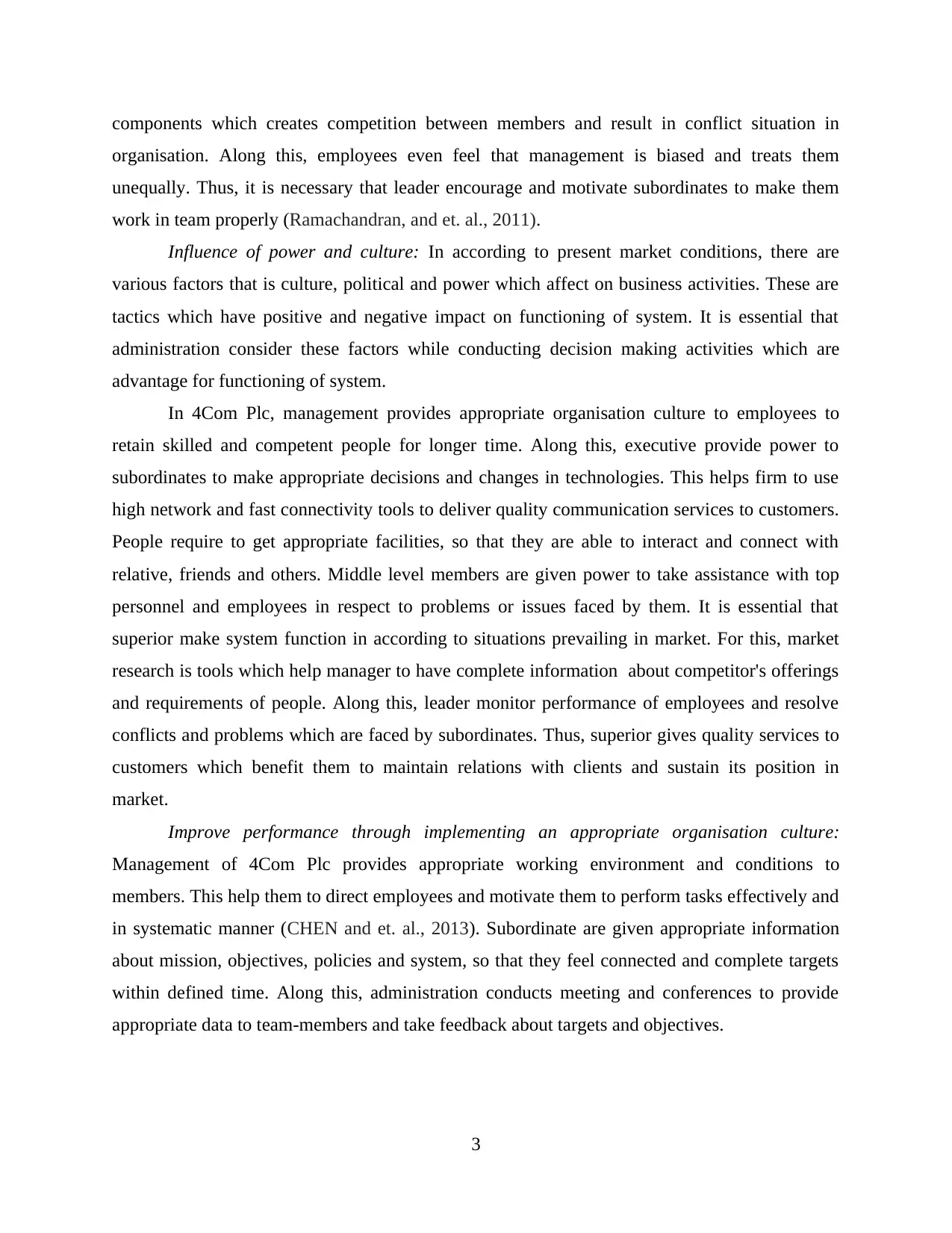
components which creates competition between members and result in conflict situation in
organisation. Along this, employees even feel that management is biased and treats them
unequally. Thus, it is necessary that leader encourage and motivate subordinates to make them
work in team properly (Ramachandran, and et. al., 2011).
Influence of power and culture: In according to present market conditions, there are
various factors that is culture, political and power which affect on business activities. These are
tactics which have positive and negative impact on functioning of system. It is essential that
administration consider these factors while conducting decision making activities which are
advantage for functioning of system.
In 4Com Plc, management provides appropriate organisation culture to employees to
retain skilled and competent people for longer time. Along this, executive provide power to
subordinates to make appropriate decisions and changes in technologies. This helps firm to use
high network and fast connectivity tools to deliver quality communication services to customers.
People require to get appropriate facilities, so that they are able to interact and connect with
relative, friends and others. Middle level members are given power to take assistance with top
personnel and employees in respect to problems or issues faced by them. It is essential that
superior make system function in according to situations prevailing in market. For this, market
research is tools which help manager to have complete information about competitor's offerings
and requirements of people. Along this, leader monitor performance of employees and resolve
conflicts and problems which are faced by subordinates. Thus, superior gives quality services to
customers which benefit them to maintain relations with clients and sustain its position in
market.
Improve performance through implementing an appropriate organisation culture:
Management of 4Com Plc provides appropriate working environment and conditions to
members. This help them to direct employees and motivate them to perform tasks effectively and
in systematic manner (CHEN and et. al., 2013). Subordinate are given appropriate information
about mission, objectives, policies and system, so that they feel connected and complete targets
within defined time. Along this, administration conducts meeting and conferences to provide
appropriate data to team-members and take feedback about targets and objectives.
3
organisation. Along this, employees even feel that management is biased and treats them
unequally. Thus, it is necessary that leader encourage and motivate subordinates to make them
work in team properly (Ramachandran, and et. al., 2011).
Influence of power and culture: In according to present market conditions, there are
various factors that is culture, political and power which affect on business activities. These are
tactics which have positive and negative impact on functioning of system. It is essential that
administration consider these factors while conducting decision making activities which are
advantage for functioning of system.
In 4Com Plc, management provides appropriate organisation culture to employees to
retain skilled and competent people for longer time. Along this, executive provide power to
subordinates to make appropriate decisions and changes in technologies. This helps firm to use
high network and fast connectivity tools to deliver quality communication services to customers.
People require to get appropriate facilities, so that they are able to interact and connect with
relative, friends and others. Middle level members are given power to take assistance with top
personnel and employees in respect to problems or issues faced by them. It is essential that
superior make system function in according to situations prevailing in market. For this, market
research is tools which help manager to have complete information about competitor's offerings
and requirements of people. Along this, leader monitor performance of employees and resolve
conflicts and problems which are faced by subordinates. Thus, superior gives quality services to
customers which benefit them to maintain relations with clients and sustain its position in
market.
Improve performance through implementing an appropriate organisation culture:
Management of 4Com Plc provides appropriate working environment and conditions to
members. This help them to direct employees and motivate them to perform tasks effectively and
in systematic manner (CHEN and et. al., 2013). Subordinate are given appropriate information
about mission, objectives, policies and system, so that they feel connected and complete targets
within defined time. Along this, administration conducts meeting and conferences to provide
appropriate data to team-members and take feedback about targets and objectives.
3
⊘ This is a preview!⊘
Do you want full access?
Subscribe today to unlock all pages.

Trusted by 1+ million students worldwide
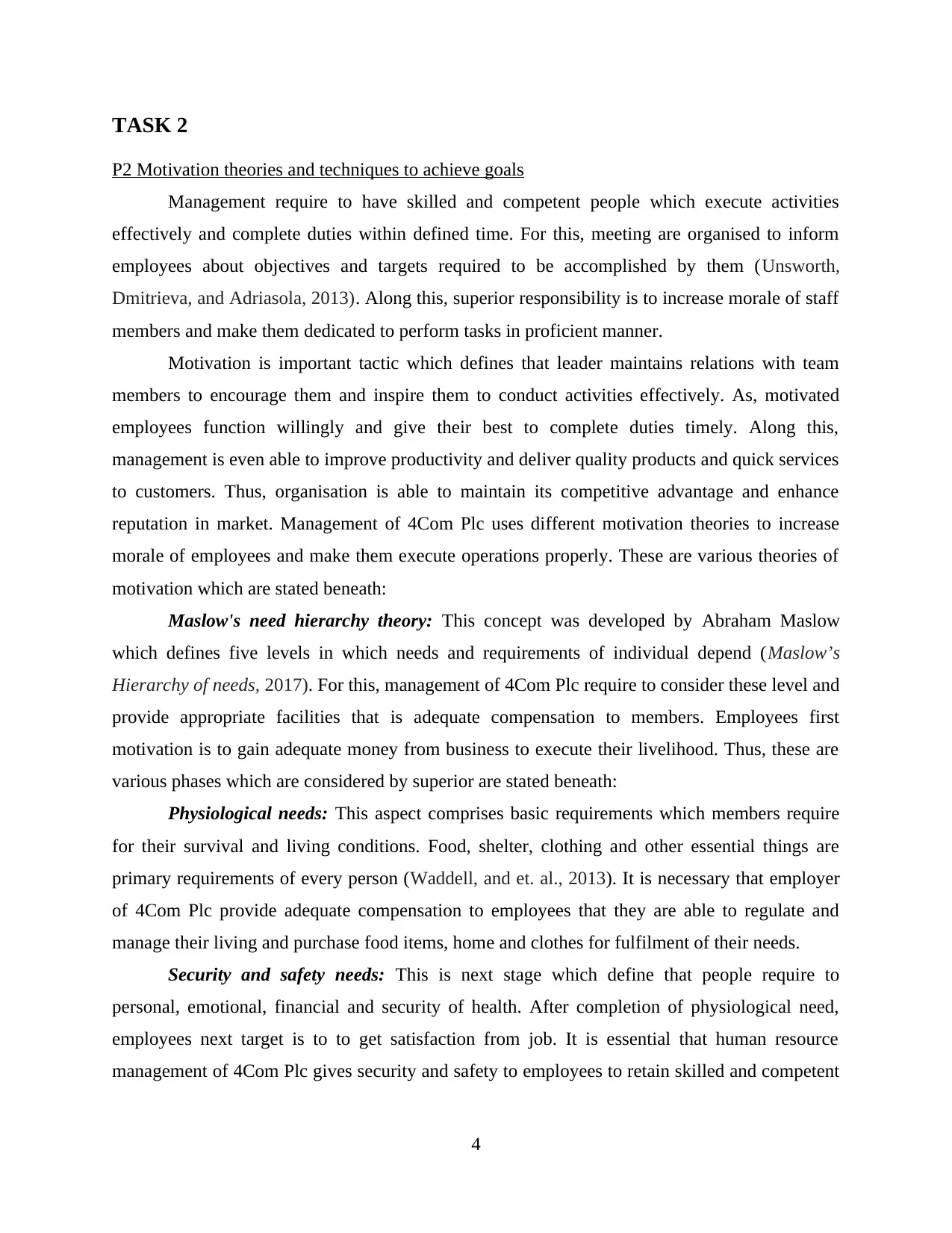
TASK 2
P2 Motivation theories and techniques to achieve goals
Management require to have skilled and competent people which execute activities
effectively and complete duties within defined time. For this, meeting are organised to inform
employees about objectives and targets required to be accomplished by them (Unsworth,
Dmitrieva, and Adriasola, 2013). Along this, superior responsibility is to increase morale of staff
members and make them dedicated to perform tasks in proficient manner.
Motivation is important tactic which defines that leader maintains relations with team
members to encourage them and inspire them to conduct activities effectively. As, motivated
employees function willingly and give their best to complete duties timely. Along this,
management is even able to improve productivity and deliver quality products and quick services
to customers. Thus, organisation is able to maintain its competitive advantage and enhance
reputation in market. Management of 4Com Plc uses different motivation theories to increase
morale of employees and make them execute operations properly. These are various theories of
motivation which are stated beneath:
Maslow's need hierarchy theory: This concept was developed by Abraham Maslow
which defines five levels in which needs and requirements of individual depend (Maslow’s
Hierarchy of needs, 2017). For this, management of 4Com Plc require to consider these level and
provide appropriate facilities that is adequate compensation to members. Employees first
motivation is to gain adequate money from business to execute their livelihood. Thus, these are
various phases which are considered by superior are stated beneath:
Physiological needs: This aspect comprises basic requirements which members require
for their survival and living conditions. Food, shelter, clothing and other essential things are
primary requirements of every person (Waddell, and et. al., 2013). It is necessary that employer
of 4Com Plc provide adequate compensation to employees that they are able to regulate and
manage their living and purchase food items, home and clothes for fulfilment of their needs.
Security and safety needs: This is next stage which define that people require to
personal, emotional, financial and security of health. After completion of physiological need,
employees next target is to to get satisfaction from job. It is essential that human resource
management of 4Com Plc gives security and safety to employees to retain skilled and competent
4
P2 Motivation theories and techniques to achieve goals
Management require to have skilled and competent people which execute activities
effectively and complete duties within defined time. For this, meeting are organised to inform
employees about objectives and targets required to be accomplished by them (Unsworth,
Dmitrieva, and Adriasola, 2013). Along this, superior responsibility is to increase morale of staff
members and make them dedicated to perform tasks in proficient manner.
Motivation is important tactic which defines that leader maintains relations with team
members to encourage them and inspire them to conduct activities effectively. As, motivated
employees function willingly and give their best to complete duties timely. Along this,
management is even able to improve productivity and deliver quality products and quick services
to customers. Thus, organisation is able to maintain its competitive advantage and enhance
reputation in market. Management of 4Com Plc uses different motivation theories to increase
morale of employees and make them execute operations properly. These are various theories of
motivation which are stated beneath:
Maslow's need hierarchy theory: This concept was developed by Abraham Maslow
which defines five levels in which needs and requirements of individual depend (Maslow’s
Hierarchy of needs, 2017). For this, management of 4Com Plc require to consider these level and
provide appropriate facilities that is adequate compensation to members. Employees first
motivation is to gain adequate money from business to execute their livelihood. Thus, these are
various phases which are considered by superior are stated beneath:
Physiological needs: This aspect comprises basic requirements which members require
for their survival and living conditions. Food, shelter, clothing and other essential things are
primary requirements of every person (Waddell, and et. al., 2013). It is necessary that employer
of 4Com Plc provide adequate compensation to employees that they are able to regulate and
manage their living and purchase food items, home and clothes for fulfilment of their needs.
Security and safety needs: This is next stage which define that people require to
personal, emotional, financial and security of health. After completion of physiological need,
employees next target is to to get satisfaction from job. It is essential that human resource
management of 4Com Plc gives security and safety to employees to retain skilled and competent
4
Paraphrase This Document
Need a fresh take? Get an instant paraphrase of this document with our AI Paraphraser
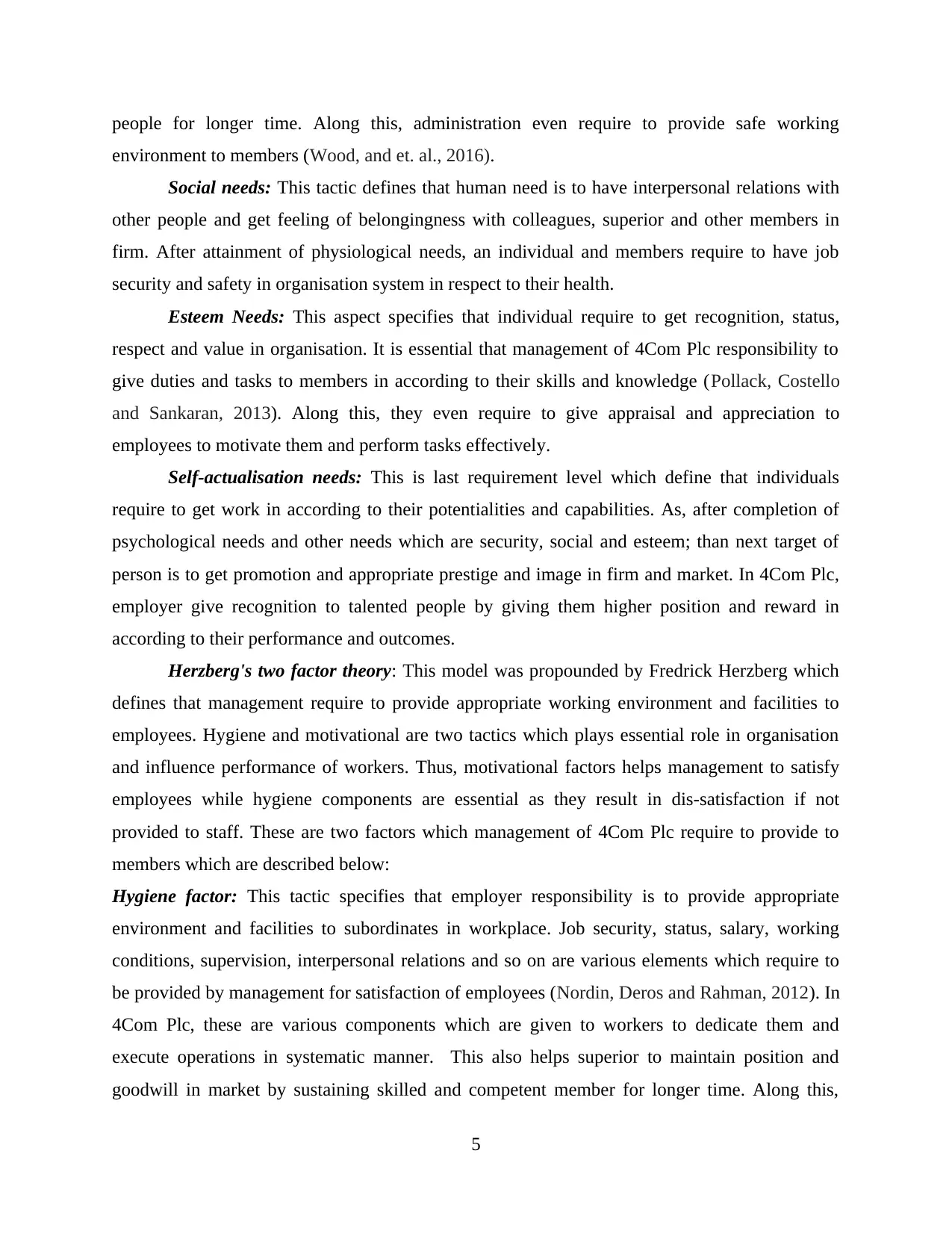
people for longer time. Along this, administration even require to provide safe working
environment to members (Wood, and et. al., 2016).
Social needs: This tactic defines that human need is to have interpersonal relations with
other people and get feeling of belongingness with colleagues, superior and other members in
firm. After attainment of physiological needs, an individual and members require to have job
security and safety in organisation system in respect to their health.
Esteem Needs: This aspect specifies that individual require to get recognition, status,
respect and value in organisation. It is essential that management of 4Com Plc responsibility to
give duties and tasks to members in according to their skills and knowledge (Pollack, Costello
and Sankaran, 2013). Along this, they even require to give appraisal and appreciation to
employees to motivate them and perform tasks effectively.
Self-actualisation needs: This is last requirement level which define that individuals
require to get work in according to their potentialities and capabilities. As, after completion of
psychological needs and other needs which are security, social and esteem; than next target of
person is to get promotion and appropriate prestige and image in firm and market. In 4Com Plc,
employer give recognition to talented people by giving them higher position and reward in
according to their performance and outcomes.
Herzberg's two factor theory: This model was propounded by Fredrick Herzberg which
defines that management require to provide appropriate working environment and facilities to
employees. Hygiene and motivational are two tactics which plays essential role in organisation
and influence performance of workers. Thus, motivational factors helps management to satisfy
employees while hygiene components are essential as they result in dis-satisfaction if not
provided to staff. These are two factors which management of 4Com Plc require to provide to
members which are described below:
Hygiene factor: This tactic specifies that employer responsibility is to provide appropriate
environment and facilities to subordinates in workplace. Job security, status, salary, working
conditions, supervision, interpersonal relations and so on are various elements which require to
be provided by management for satisfaction of employees (Nordin, Deros and Rahman, 2012). In
4Com Plc, these are various components which are given to workers to dedicate them and
execute operations in systematic manner. This also helps superior to maintain position and
goodwill in market by sustaining skilled and competent member for longer time. Along this,
5
environment to members (Wood, and et. al., 2016).
Social needs: This tactic defines that human need is to have interpersonal relations with
other people and get feeling of belongingness with colleagues, superior and other members in
firm. After attainment of physiological needs, an individual and members require to have job
security and safety in organisation system in respect to their health.
Esteem Needs: This aspect specifies that individual require to get recognition, status,
respect and value in organisation. It is essential that management of 4Com Plc responsibility to
give duties and tasks to members in according to their skills and knowledge (Pollack, Costello
and Sankaran, 2013). Along this, they even require to give appraisal and appreciation to
employees to motivate them and perform tasks effectively.
Self-actualisation needs: This is last requirement level which define that individuals
require to get work in according to their potentialities and capabilities. As, after completion of
psychological needs and other needs which are security, social and esteem; than next target of
person is to get promotion and appropriate prestige and image in firm and market. In 4Com Plc,
employer give recognition to talented people by giving them higher position and reward in
according to their performance and outcomes.
Herzberg's two factor theory: This model was propounded by Fredrick Herzberg which
defines that management require to provide appropriate working environment and facilities to
employees. Hygiene and motivational are two tactics which plays essential role in organisation
and influence performance of workers. Thus, motivational factors helps management to satisfy
employees while hygiene components are essential as they result in dis-satisfaction if not
provided to staff. These are two factors which management of 4Com Plc require to provide to
members which are described below:
Hygiene factor: This tactic specifies that employer responsibility is to provide appropriate
environment and facilities to subordinates in workplace. Job security, status, salary, working
conditions, supervision, interpersonal relations and so on are various elements which require to
be provided by management for satisfaction of employees (Nordin, Deros and Rahman, 2012). In
4Com Plc, these are various components which are given to workers to dedicate them and
execute operations in systematic manner. This also helps superior to maintain position and
goodwill in market by sustaining skilled and competent member for longer time. Along this,
5
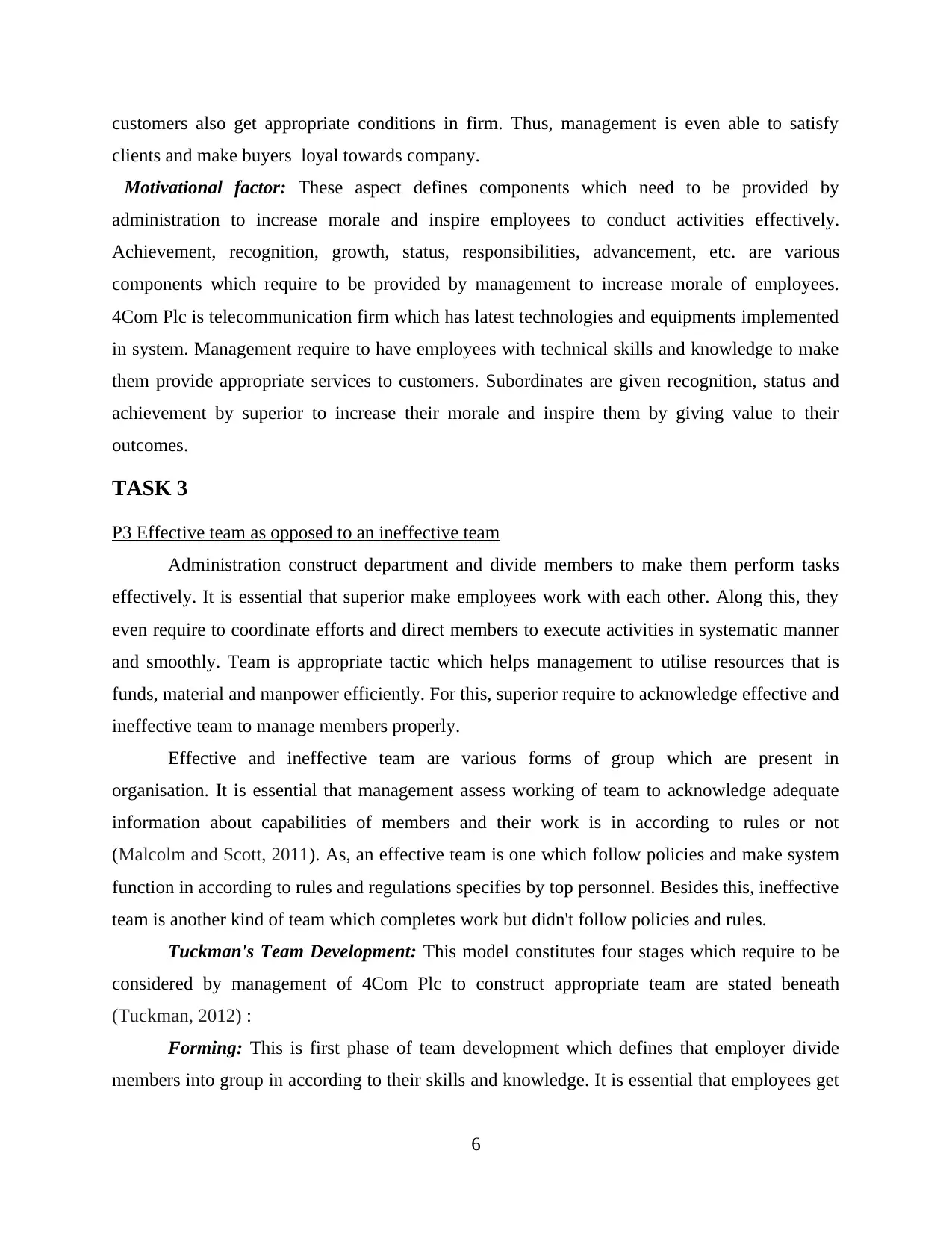
customers also get appropriate conditions in firm. Thus, management is even able to satisfy
clients and make buyers loyal towards company.
Motivational factor: These aspect defines components which need to be provided by
administration to increase morale and inspire employees to conduct activities effectively.
Achievement, recognition, growth, status, responsibilities, advancement, etc. are various
components which require to be provided by management to increase morale of employees.
4Com Plc is telecommunication firm which has latest technologies and equipments implemented
in system. Management require to have employees with technical skills and knowledge to make
them provide appropriate services to customers. Subordinates are given recognition, status and
achievement by superior to increase their morale and inspire them by giving value to their
outcomes.
TASK 3
P3 Effective team as opposed to an ineffective team
Administration construct department and divide members to make them perform tasks
effectively. It is essential that superior make employees work with each other. Along this, they
even require to coordinate efforts and direct members to execute activities in systematic manner
and smoothly. Team is appropriate tactic which helps management to utilise resources that is
funds, material and manpower efficiently. For this, superior require to acknowledge effective and
ineffective team to manage members properly.
Effective and ineffective team are various forms of group which are present in
organisation. It is essential that management assess working of team to acknowledge adequate
information about capabilities of members and their work is in according to rules or not
(Malcolm and Scott, 2011). As, an effective team is one which follow policies and make system
function in according to rules and regulations specifies by top personnel. Besides this, ineffective
team is another kind of team which completes work but didn't follow policies and rules.
Tuckman's Team Development: This model constitutes four stages which require to be
considered by management of 4Com Plc to construct appropriate team are stated beneath
(Tuckman, 2012) :
Forming: This is first phase of team development which defines that employer divide
members into group in according to their skills and knowledge. It is essential that employees get
6
clients and make buyers loyal towards company.
Motivational factor: These aspect defines components which need to be provided by
administration to increase morale and inspire employees to conduct activities effectively.
Achievement, recognition, growth, status, responsibilities, advancement, etc. are various
components which require to be provided by management to increase morale of employees.
4Com Plc is telecommunication firm which has latest technologies and equipments implemented
in system. Management require to have employees with technical skills and knowledge to make
them provide appropriate services to customers. Subordinates are given recognition, status and
achievement by superior to increase their morale and inspire them by giving value to their
outcomes.
TASK 3
P3 Effective team as opposed to an ineffective team
Administration construct department and divide members to make them perform tasks
effectively. It is essential that superior make employees work with each other. Along this, they
even require to coordinate efforts and direct members to execute activities in systematic manner
and smoothly. Team is appropriate tactic which helps management to utilise resources that is
funds, material and manpower efficiently. For this, superior require to acknowledge effective and
ineffective team to manage members properly.
Effective and ineffective team are various forms of group which are present in
organisation. It is essential that management assess working of team to acknowledge adequate
information about capabilities of members and their work is in according to rules or not
(Malcolm and Scott, 2011). As, an effective team is one which follow policies and make system
function in according to rules and regulations specifies by top personnel. Besides this, ineffective
team is another kind of team which completes work but didn't follow policies and rules.
Tuckman's Team Development: This model constitutes four stages which require to be
considered by management of 4Com Plc to construct appropriate team are stated beneath
(Tuckman, 2012) :
Forming: This is first phase of team development which defines that employer divide
members into group in according to their skills and knowledge. It is essential that employees get
6
⊘ This is a preview!⊘
Do you want full access?
Subscribe today to unlock all pages.

Trusted by 1+ million students worldwide
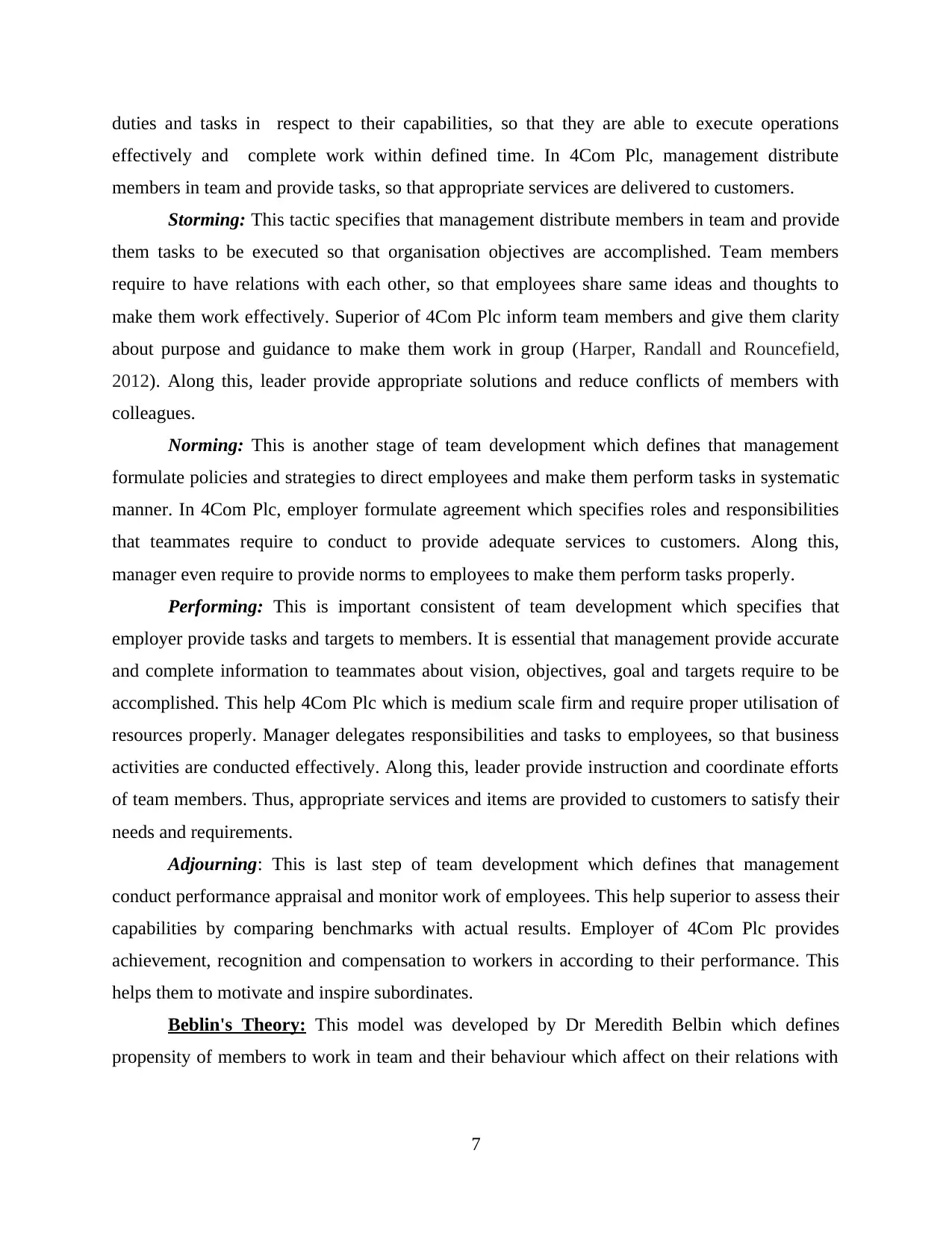
duties and tasks in respect to their capabilities, so that they are able to execute operations
effectively and complete work within defined time. In 4Com Plc, management distribute
members in team and provide tasks, so that appropriate services are delivered to customers.
Storming: This tactic specifies that management distribute members in team and provide
them tasks to be executed so that organisation objectives are accomplished. Team members
require to have relations with each other, so that employees share same ideas and thoughts to
make them work effectively. Superior of 4Com Plc inform team members and give them clarity
about purpose and guidance to make them work in group (Harper, Randall and Rouncefield,
2012). Along this, leader provide appropriate solutions and reduce conflicts of members with
colleagues.
Norming: This is another stage of team development which defines that management
formulate policies and strategies to direct employees and make them perform tasks in systematic
manner. In 4Com Plc, employer formulate agreement which specifies roles and responsibilities
that teammates require to conduct to provide adequate services to customers. Along this,
manager even require to provide norms to employees to make them perform tasks properly.
Performing: This is important consistent of team development which specifies that
employer provide tasks and targets to members. It is essential that management provide accurate
and complete information to teammates about vision, objectives, goal and targets require to be
accomplished. This help 4Com Plc which is medium scale firm and require proper utilisation of
resources properly. Manager delegates responsibilities and tasks to employees, so that business
activities are conducted effectively. Along this, leader provide instruction and coordinate efforts
of team members. Thus, appropriate services and items are provided to customers to satisfy their
needs and requirements.
Adjourning: This is last step of team development which defines that management
conduct performance appraisal and monitor work of employees. This help superior to assess their
capabilities by comparing benchmarks with actual results. Employer of 4Com Plc provides
achievement, recognition and compensation to workers in according to their performance. This
helps them to motivate and inspire subordinates.
Beblin's Theory: This model was developed by Dr Meredith Belbin which defines
propensity of members to work in team and their behaviour which affect on their relations with
7
effectively and complete work within defined time. In 4Com Plc, management distribute
members in team and provide tasks, so that appropriate services are delivered to customers.
Storming: This tactic specifies that management distribute members in team and provide
them tasks to be executed so that organisation objectives are accomplished. Team members
require to have relations with each other, so that employees share same ideas and thoughts to
make them work effectively. Superior of 4Com Plc inform team members and give them clarity
about purpose and guidance to make them work in group (Harper, Randall and Rouncefield,
2012). Along this, leader provide appropriate solutions and reduce conflicts of members with
colleagues.
Norming: This is another stage of team development which defines that management
formulate policies and strategies to direct employees and make them perform tasks in systematic
manner. In 4Com Plc, employer formulate agreement which specifies roles and responsibilities
that teammates require to conduct to provide adequate services to customers. Along this,
manager even require to provide norms to employees to make them perform tasks properly.
Performing: This is important consistent of team development which specifies that
employer provide tasks and targets to members. It is essential that management provide accurate
and complete information to teammates about vision, objectives, goal and targets require to be
accomplished. This help 4Com Plc which is medium scale firm and require proper utilisation of
resources properly. Manager delegates responsibilities and tasks to employees, so that business
activities are conducted effectively. Along this, leader provide instruction and coordinate efforts
of team members. Thus, appropriate services and items are provided to customers to satisfy their
needs and requirements.
Adjourning: This is last step of team development which defines that management
conduct performance appraisal and monitor work of employees. This help superior to assess their
capabilities by comparing benchmarks with actual results. Employer of 4Com Plc provides
achievement, recognition and compensation to workers in according to their performance. This
helps them to motivate and inspire subordinates.
Beblin's Theory: This model was developed by Dr Meredith Belbin which defines
propensity of members to work in team and their behaviour which affect on their relations with
7
Paraphrase This Document
Need a fresh take? Get an instant paraphrase of this document with our AI Paraphraser
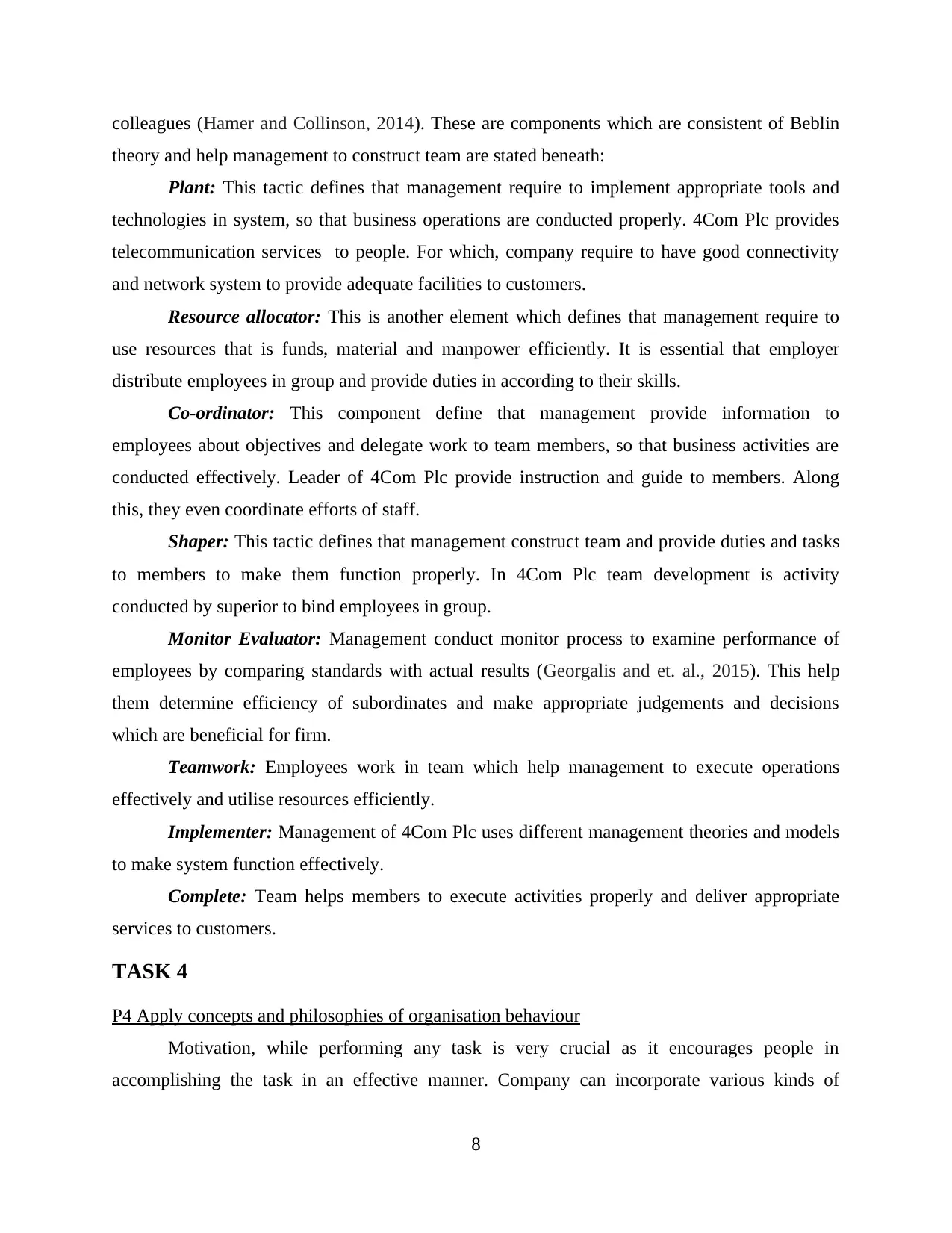
colleagues (Hamer and Collinson, 2014). These are components which are consistent of Beblin
theory and help management to construct team are stated beneath:
Plant: This tactic defines that management require to implement appropriate tools and
technologies in system, so that business operations are conducted properly. 4Com Plc provides
telecommunication services to people. For which, company require to have good connectivity
and network system to provide adequate facilities to customers.
Resource allocator: This is another element which defines that management require to
use resources that is funds, material and manpower efficiently. It is essential that employer
distribute employees in group and provide duties in according to their skills.
Co-ordinator: This component define that management provide information to
employees about objectives and delegate work to team members, so that business activities are
conducted effectively. Leader of 4Com Plc provide instruction and guide to members. Along
this, they even coordinate efforts of staff.
Shaper: This tactic defines that management construct team and provide duties and tasks
to members to make them function properly. In 4Com Plc team development is activity
conducted by superior to bind employees in group.
Monitor Evaluator: Management conduct monitor process to examine performance of
employees by comparing standards with actual results (Georgalis and et. al., 2015). This help
them determine efficiency of subordinates and make appropriate judgements and decisions
which are beneficial for firm.
Teamwork: Employees work in team which help management to execute operations
effectively and utilise resources efficiently.
Implementer: Management of 4Com Plc uses different management theories and models
to make system function effectively.
Complete: Team helps members to execute activities properly and deliver appropriate
services to customers.
TASK 4
P4 Apply concepts and philosophies of organisation behaviour
Motivation, while performing any task is very crucial as it encourages people in
accomplishing the task in an effective manner. Company can incorporate various kinds of
8
theory and help management to construct team are stated beneath:
Plant: This tactic defines that management require to implement appropriate tools and
technologies in system, so that business operations are conducted properly. 4Com Plc provides
telecommunication services to people. For which, company require to have good connectivity
and network system to provide adequate facilities to customers.
Resource allocator: This is another element which defines that management require to
use resources that is funds, material and manpower efficiently. It is essential that employer
distribute employees in group and provide duties in according to their skills.
Co-ordinator: This component define that management provide information to
employees about objectives and delegate work to team members, so that business activities are
conducted effectively. Leader of 4Com Plc provide instruction and guide to members. Along
this, they even coordinate efforts of staff.
Shaper: This tactic defines that management construct team and provide duties and tasks
to members to make them function properly. In 4Com Plc team development is activity
conducted by superior to bind employees in group.
Monitor Evaluator: Management conduct monitor process to examine performance of
employees by comparing standards with actual results (Georgalis and et. al., 2015). This help
them determine efficiency of subordinates and make appropriate judgements and decisions
which are beneficial for firm.
Teamwork: Employees work in team which help management to execute operations
effectively and utilise resources efficiently.
Implementer: Management of 4Com Plc uses different management theories and models
to make system function effectively.
Complete: Team helps members to execute activities properly and deliver appropriate
services to customers.
TASK 4
P4 Apply concepts and philosophies of organisation behaviour
Motivation, while performing any task is very crucial as it encourages people in
accomplishing the task in an effective manner. Company can incorporate various kinds of
8
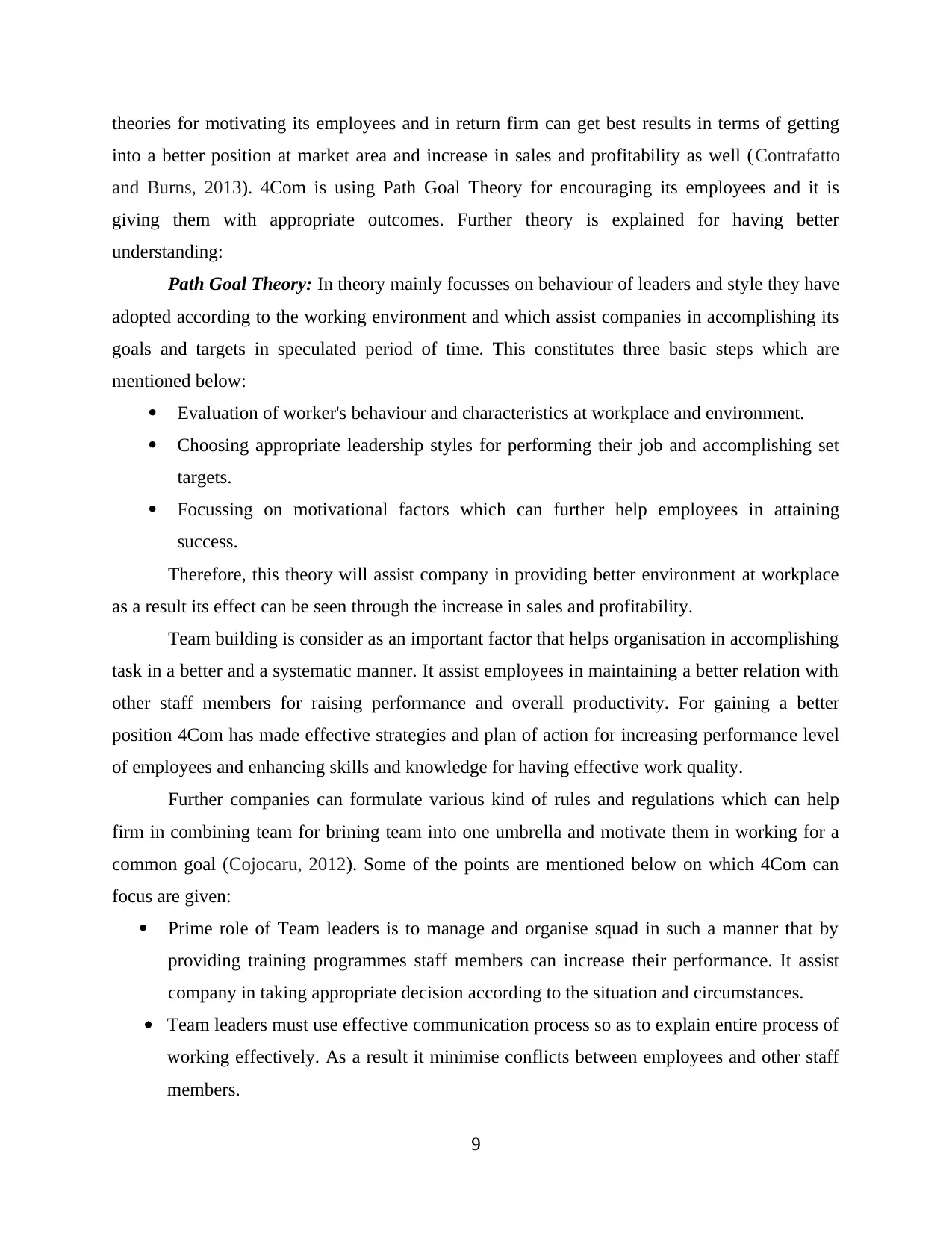
theories for motivating its employees and in return firm can get best results in terms of getting
into a better position at market area and increase in sales and profitability as well (Contrafatto
and Burns, 2013). 4Com is using Path Goal Theory for encouraging its employees and it is
giving them with appropriate outcomes. Further theory is explained for having better
understanding:
Path Goal Theory: In theory mainly focusses on behaviour of leaders and style they have
adopted according to the working environment and which assist companies in accomplishing its
goals and targets in speculated period of time. This constitutes three basic steps which are
mentioned below:
Evaluation of worker's behaviour and characteristics at workplace and environment.
Choosing appropriate leadership styles for performing their job and accomplishing set
targets.
Focussing on motivational factors which can further help employees in attaining
success.
Therefore, this theory will assist company in providing better environment at workplace
as a result its effect can be seen through the increase in sales and profitability.
Team building is consider as an important factor that helps organisation in accomplishing
task in a better and a systematic manner. It assist employees in maintaining a better relation with
other staff members for raising performance and overall productivity. For gaining a better
position 4Com has made effective strategies and plan of action for increasing performance level
of employees and enhancing skills and knowledge for having effective work quality.
Further companies can formulate various kind of rules and regulations which can help
firm in combining team for brining team into one umbrella and motivate them in working for a
common goal (Cojocaru, 2012). Some of the points are mentioned below on which 4Com can
focus are given:
Prime role of Team leaders is to manage and organise squad in such a manner that by
providing training programmes staff members can increase their performance. It assist
company in taking appropriate decision according to the situation and circumstances.
Team leaders must use effective communication process so as to explain entire process of
working effectively. As a result it minimise conflicts between employees and other staff
members.
9
into a better position at market area and increase in sales and profitability as well (Contrafatto
and Burns, 2013). 4Com is using Path Goal Theory for encouraging its employees and it is
giving them with appropriate outcomes. Further theory is explained for having better
understanding:
Path Goal Theory: In theory mainly focusses on behaviour of leaders and style they have
adopted according to the working environment and which assist companies in accomplishing its
goals and targets in speculated period of time. This constitutes three basic steps which are
mentioned below:
Evaluation of worker's behaviour and characteristics at workplace and environment.
Choosing appropriate leadership styles for performing their job and accomplishing set
targets.
Focussing on motivational factors which can further help employees in attaining
success.
Therefore, this theory will assist company in providing better environment at workplace
as a result its effect can be seen through the increase in sales and profitability.
Team building is consider as an important factor that helps organisation in accomplishing
task in a better and a systematic manner. It assist employees in maintaining a better relation with
other staff members for raising performance and overall productivity. For gaining a better
position 4Com has made effective strategies and plan of action for increasing performance level
of employees and enhancing skills and knowledge for having effective work quality.
Further companies can formulate various kind of rules and regulations which can help
firm in combining team for brining team into one umbrella and motivate them in working for a
common goal (Cojocaru, 2012). Some of the points are mentioned below on which 4Com can
focus are given:
Prime role of Team leaders is to manage and organise squad in such a manner that by
providing training programmes staff members can increase their performance. It assist
company in taking appropriate decision according to the situation and circumstances.
Team leaders must use effective communication process so as to explain entire process of
working effectively. As a result it minimise conflicts between employees and other staff
members.
9
⊘ This is a preview!⊘
Do you want full access?
Subscribe today to unlock all pages.

Trusted by 1+ million students worldwide
1 out of 15
Related Documents
Your All-in-One AI-Powered Toolkit for Academic Success.
+13062052269
info@desklib.com
Available 24*7 on WhatsApp / Email
![[object Object]](/_next/static/media/star-bottom.7253800d.svg)
Unlock your academic potential
Copyright © 2020–2026 A2Z Services. All Rights Reserved. Developed and managed by ZUCOL.





